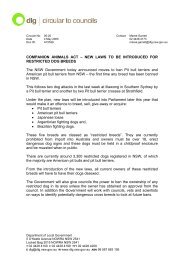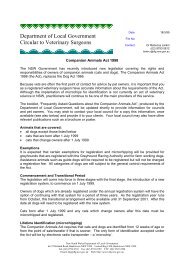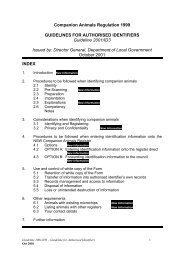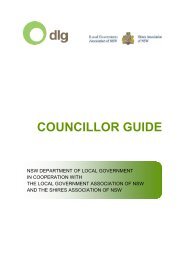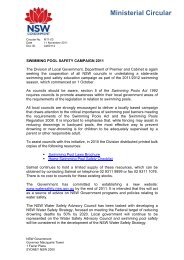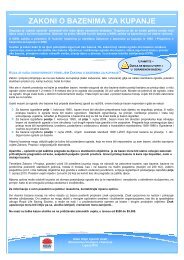Integrated Planning and Reporting Manual - Division of Local ...
Integrated Planning and Reporting Manual - Division of Local ...
Integrated Planning and Reporting Manual - Division of Local ...
You also want an ePaper? Increase the reach of your titles
YUMPU automatically turns print PDFs into web optimized ePapers that Google loves.
4. THE DELIVERY PROGRAM<br />
4.6 Allocating responsibilities<br />
Essential Element 3.5<br />
The Delivery Program must allocate responsibilities for each action or set <strong>of</strong> actions.<br />
One <strong>of</strong> the important requirements <strong>of</strong> both the Delivery Program <strong>and</strong> the Operational Plan is to<br />
identify who will be responsible within Council for completing the various projects or activities. This<br />
gives a clear picture <strong>of</strong> expectations, accountabilities <strong>and</strong> timeframes.<br />
For the Delivery Program, the minimum requirement should be to allocate responsibilities to at least<br />
‘director’ level, but it is preferable to allocate to a further level below this so that project managers,<br />
as well as their Directors, are held responsible for delivering outcomes.<br />
For example, if one <strong>of</strong> the strategies in the Delivery Program is “Ensure libraries are socially<br />
inclusive <strong>and</strong> user friendly” then the Program could nominate the Director <strong>of</strong> Community Services as<br />
being the responsible person for delivering this action. However, it would be preferable to also<br />
nominate the Manager <strong>of</strong> Library Services, as this makes it much clearer that responsibility for<br />
delivering the action sits within a particular section <strong>of</strong> the Community Services division.<br />
For the Operational Plan, responsibilities should be allocated to at least ‘middle management’ level.<br />
Councils will need to interpret this within the context <strong>of</strong> their own organisational structures, but the<br />
intention is that, as the plans get more detailed, the allocation <strong>of</strong> responsibility will get more specific.<br />
For example, it is not sufficient to nominate the Director <strong>of</strong> Works <strong>and</strong> Services as the sole person<br />
responsible for a list <strong>of</strong> proposed road maintenance works in the Operational Plan. At this level <strong>of</strong><br />
detail, the allocation <strong>of</strong> responsibilty should be, for example, with the Manager <strong>of</strong> Roads.<br />
One <strong>of</strong> the General Manager’s key responsibilities in implementing the plans is to ensure that<br />
council staff underst<strong>and</strong> the bigger picture, including how their particular duties are helping to<br />
achieve strategic objectives <strong>and</strong> better outcomes for the community.<br />
One way <strong>of</strong> doing this is to link Delivery Program <strong>and</strong> Operational Plan responsibilities to the staff<br />
performance system, so that they become an intrinsic part <strong>of</strong> a staff member’s regular performance<br />
review with his or her supervisor/s. The diagram that follows shows how the relationships work.<br />
<strong>Planning</strong> & <strong>Reporting</strong> <strong>Manual</strong> Page 94 <strong>of</strong> 115





